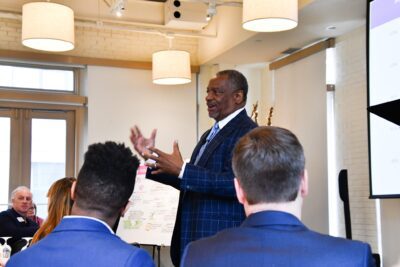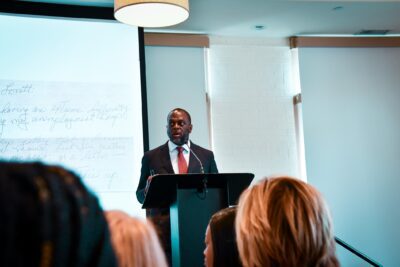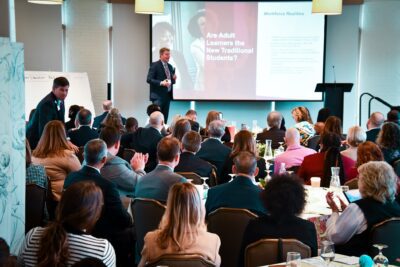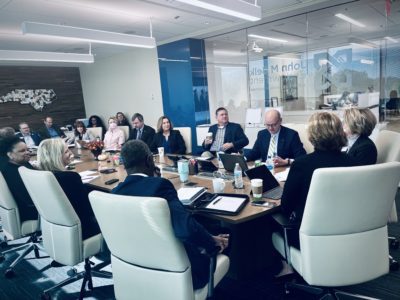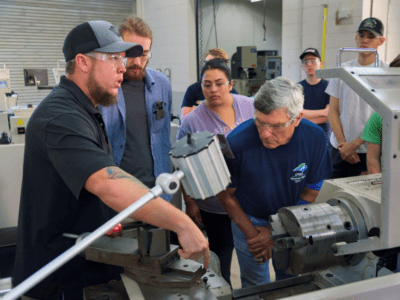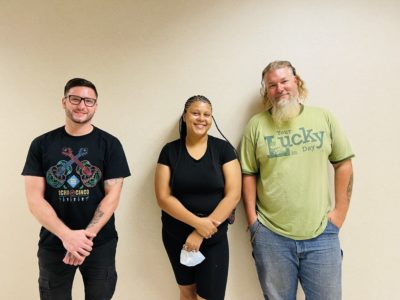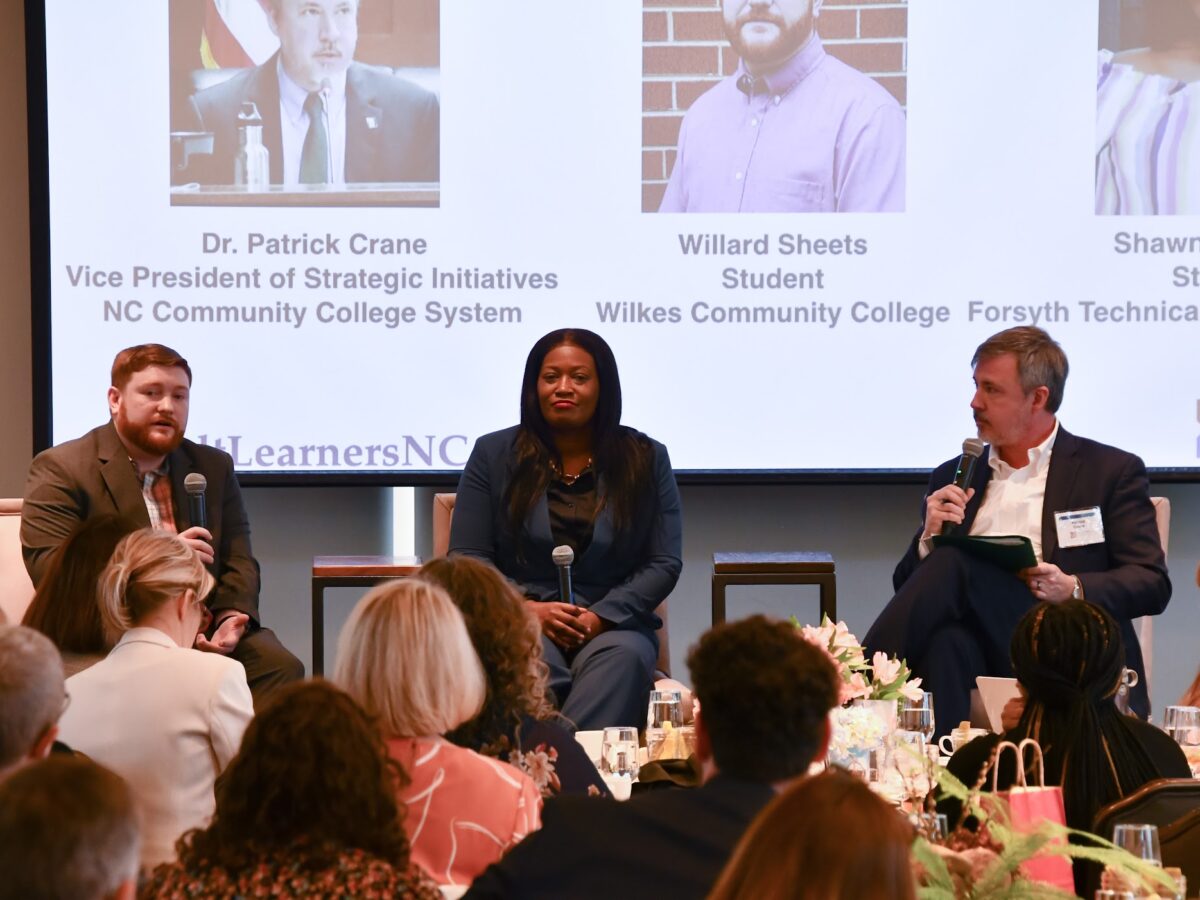

Share this story
- "Serving adult learners is not new for community colleges… there’s a shift occurring right now that makes it clear the traditional student pipeline is dwindling, and adult learners need this credential growing culture," said @BelkEndowment's MC Belk Pilon.
- According to @NCCommColleges leaders, reaching adult learners is key to increasing enrollment and statewide attainment, and in turn, decreasing workforce shortages.
|
|
State leaders, education stakeholders, and representatives from 52 N.C. community colleges gathered in Greensboro last week for the first statewide convening on how to reengage adult learners.
The event, hosted by the John M. Belk Endowment (JMBE) and EducationNC, focused on adult learners and the future of higher education.
On Wednesday, attendees heard from education leaders across the state and U.S. about trends impacting adult learners and community colleges, and from adult learners themselves.
“Today is a focused opportunity to learn and collaborate about what I believe is one of the most pressing higher education issues of our time: how we pivot and truly become adult-learner centered institutions,” said MC Belk Pilon, JMBE’s president and board chair. “To be clear, serving adult learners is not new for community colleges… but there’s a shift occurring right now (that) makes it clear the traditional student pipeline is dwindling, and the adult learners need this credential growing culture.”
That shift, Belk Pilon added, also makes it clear that serving adult learners means changing instruction delivery, campus operations, and “how at our very core we think about higher education.”
“I do want to take a moment and step back and talk about the why for this work,” she said. “North Carolina, like most states, has a gap between what we need to grow economically and our state’s current attainment levels. Based on our goal to help 2 million North Carolinians between the ages of 25 and 44 achieve a high-quality credential or degree by 2030, we need to close a gap of over 444,000 college graduates.”
More than 39 million adults in the U.S. have at least some college credit and no degree or credential, according to the National Student Clearinghouse Research Center. There were slightly more than 1 million North Carolina adults with some college but no degree or credential as of July 2020. Nearly 34% of those adults are younger than 35 and about 54% are ages 35 to 64.
N.C. Community College System (NCCCS) leaders say that reaching adult learners is key to increasing enrollment and statewide attainment, and in turn, decreasing workforce shortages.
According to a January report by myFutureNC, the state is behind where it needs to be to meet the 2 million goal by 2030. While much work remains, NCCCS leaders and stakeholders took time to celebrate their efforts at the start of the convening.
Just the week before, the State Board of Community Colleges heard news that the number of adult learners enrolled in N.C. community colleges increased by 10% since the system launched its two adult learner pilot programs, N.C. Reconnect and REACH. The 29 participating colleges in those initiatives saw a 9% growth in adult learners over the last two years.
“Closing this gap is really about our ability to increase economic mobility for individuals, while remaining economically competitive as a state,” Belk Pilon said. “In addition, relative to our discussions today, it’s impossible to close this gap without reaching adult learners – it’s literally not mathematically possible.”
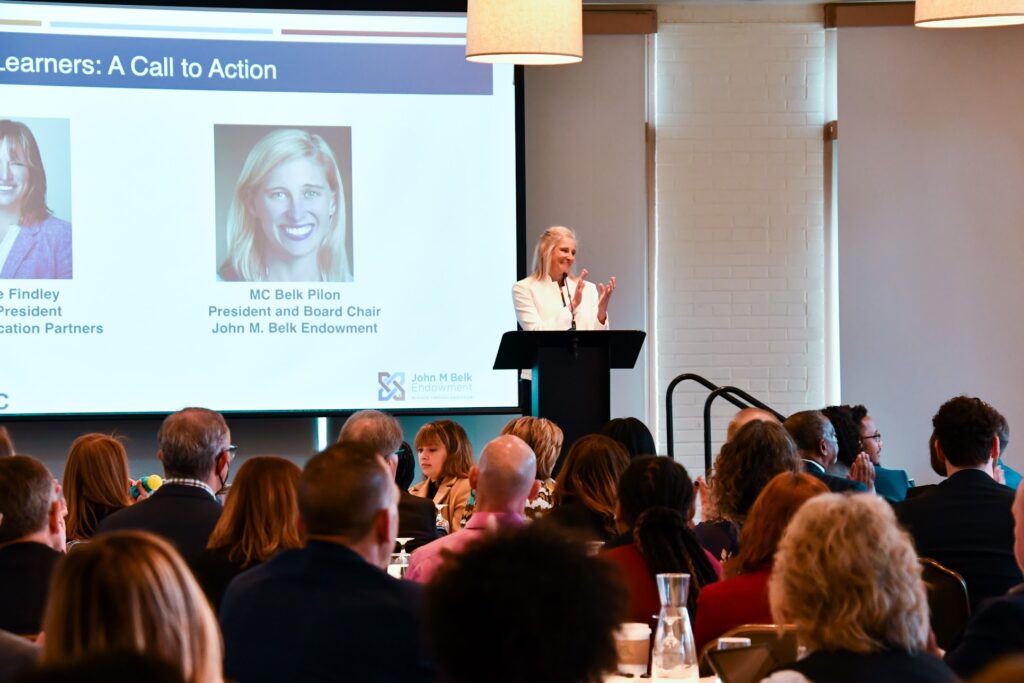

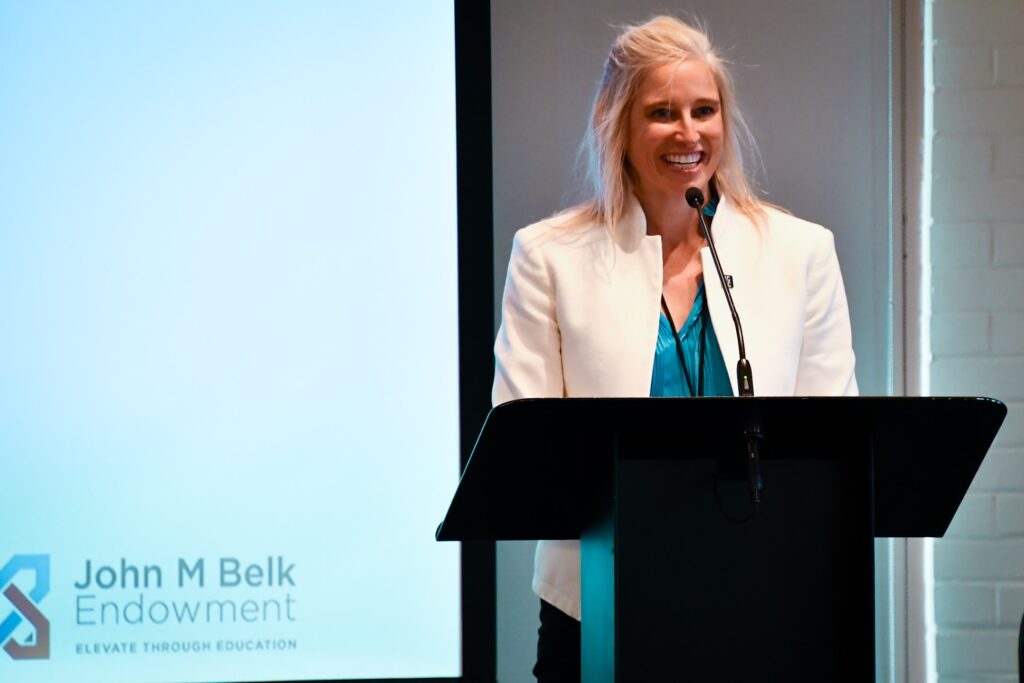

Last year, the Belk Center, in partnership with JMBE, the NCCCS, and myFutureNC, released a comprehensive Adult Learner Guidebook that synthesized key takeaways from the first cohort of five colleges participating in N.C. Reconnect.
At the start of Wednesday’s convening, JMBE Senior Advisor Mike Krause outlined three big themes from that research: personalizing outreach, shifting messages beyond traditional college students, and leaning into community spaces.
“There are no silver bullets when it comes to serving adult learners, but there are initiatives that have silver-bullet like qualities,” Krause said. “And if we all go home today with one more silver-bullet like initiative to take that to our teams, I think that’s a good day’s work.”
You can read tweets from the convening by searching #AdultLearnersNC on Twitter. You can also check out the following articles about three presentations at the convening:
Marketing to and engaging adult learners
Wednesday’s convening included two breakout sessions for community college leaders to attend.
Adult learner initiatives
The first breakout sessions focused on the system’s two adult learner initiatives: N.C. Reconnect and REACH.
N.C. Reconnect launched in 2021 and has been led and financially supported by JMBE to increase enrollment of adult learners at N.C. community colleges. The program focuses on adults who have some college credits but no degree. So far, the program has supported 10 colleges and plans to expand.
REACH is a national collaborative with more than 150 community colleges in six states. The group focuses on increasing completion rates among “adult learners from communities of color in high-value, short-term credential programs.” The three pillars of REACH include aligning non-credit to associate degree career pathways, bundling/sequencing student support services, and implementing culturally supportive practices.
In 2021, the NCCCS received $2 million from the General Assembly to expand the work of adult learner pilot programs. The NCCCS allocated grants to the 29 colleges participating in one or both pilot programs for marketing, outreach, and other enrollment efforts.
Moving forward, REACH will have another statewide cohort through December 2024 (REACH Deep), along with a national cohort including two N.C. colleges (REACH Deeper). The REACH goal is a 2% increase in credential attainment for enrolled Black, Hispanic, and Native Americans ages 25-64 at participating colleges by 2024.
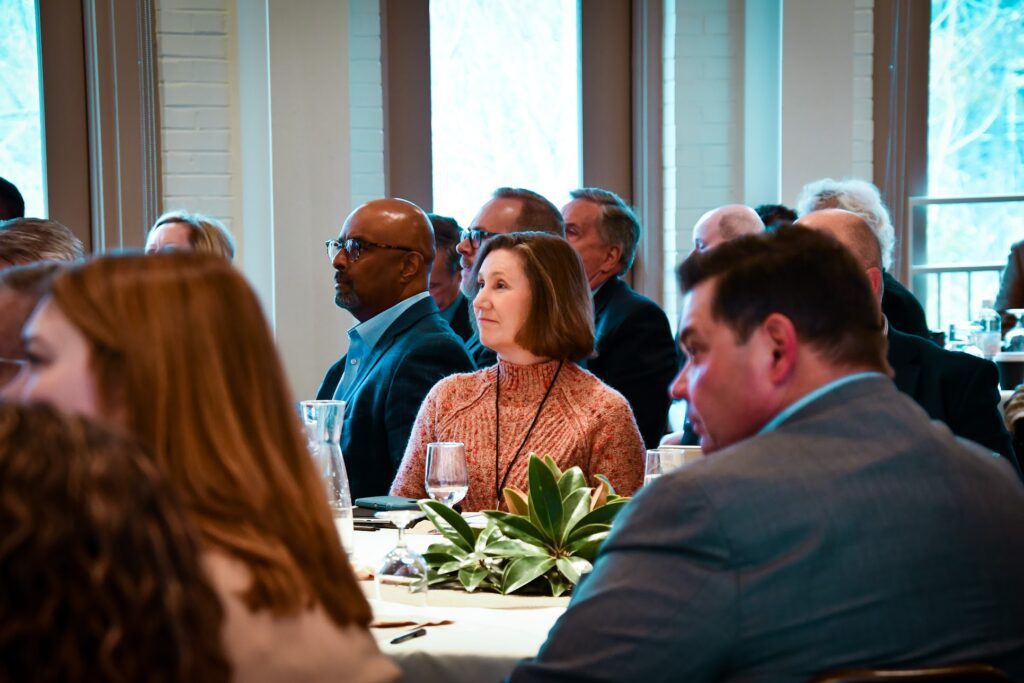

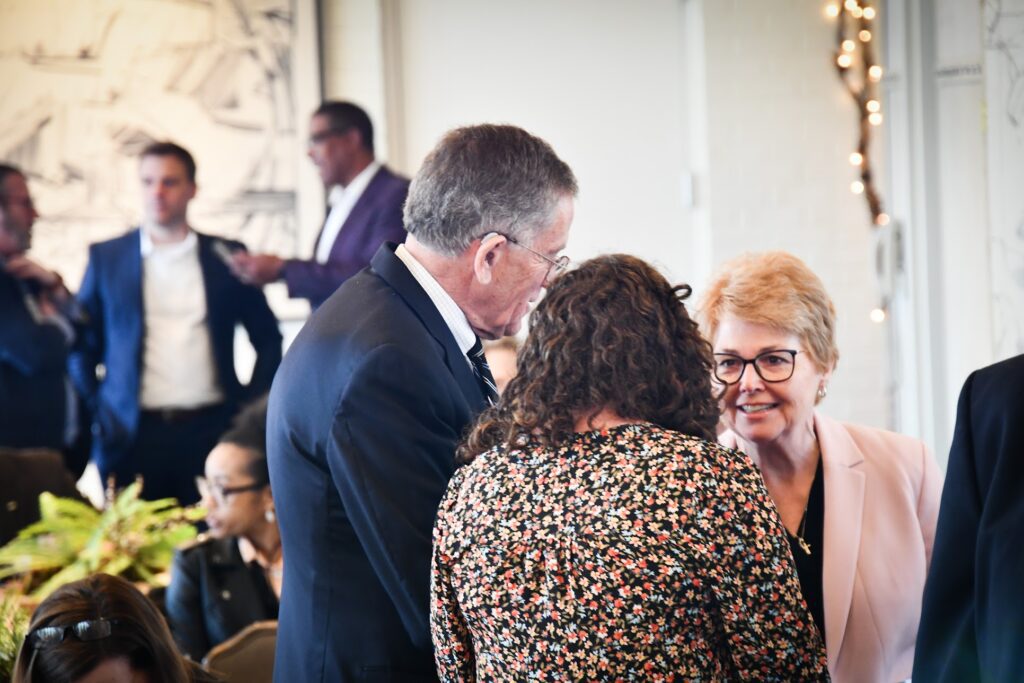

Wraparound services
The second breakout sessions focused on wraparound services for, and marketing to, adult learners.
Wraparound services include resources like financial assistance, food pantries, transportation, child care support, and more. NCCCS leaders say that meeting the basic needs of students is key to student success.
However, students don’t always know about available resources. LaTasha Bradford, president of the N.C. Comprehensive Community College Student Government Association (N4CSGA), told the State Board of Community Colleges that most students are unsure of the resources available to them, according to N4CSGA’s most recent system-wide student survey results.
Marbeth Holmes, Nash Community College‘s dean of student wellness, previously told EdNC that without building relationships with students, even the best resources won’t work.
“We work very hard to build trust,” Holmes said. “If they trust us, they will utilize our services. If they utilize our services, their work and their stability and their wellness will improve — so that’s fundamental.”
Marketing
Marketing to adult learners should entail flexible messaging that colleges can apply to their specific programs and services, breakout panelists said.
Importantly, colleges must deliver on what they promise through marketing. Student testimonies and data provide credibility and authenticity, the speakers said.
In addition to paid marketing, colleges should also work to connect with media outlets, and host special outreach events to meet students where they are.
Here are a few more lessons from the N.C. Reconnect marketing campaign presented at the session:
- Promote high-demand pathways.
- Student testimonials add credibility.
- Marketing needs to be top-of-mind sooner to impact enrollment.
- Robust and authentic visual library goes a long way.
- Use targeting tactics on Facebook, Instagram, and Google Search, etc.
- Be prepared to offer quick and consistent responses that go beyond email, and then follow up.
- Proof your content to make sure the information you are marketing is accurate.
- Get a good partner.
- There is no wrong time to start.
Hearing from adult learners
The main event of the day, according to many in attendance, was hearing directly from two adult learners at N.C. community colleges.
LaShawnna Hardin, a student at Forsyth Technical Community College, will graduate in May, along with her co-panelist, Willard Sheets, a student at Wilkes Community College.
The panel was moderated by Dr. Patrick Crane, NCCCS vice president of strategic initiatives. He started the discussion by asking about each of the student’s journeys to community college.
“When I was younger, I used to stop and start something. I always had pretty decent jobs, but I never had the credentials behind the experience. When it was time to apply for jobs, someone with credentials would beat me,” Hardin said. “So one day I just made up my mind that I was just going to go back and I was just going to do it. I guess I’m doing it because I’ll be graduating May 10.”
Hardin learned about Forsyth Tech through a postcard she got in the mail, she said, which led to her eventually attending a N.C. Reconnect event a few years ago.
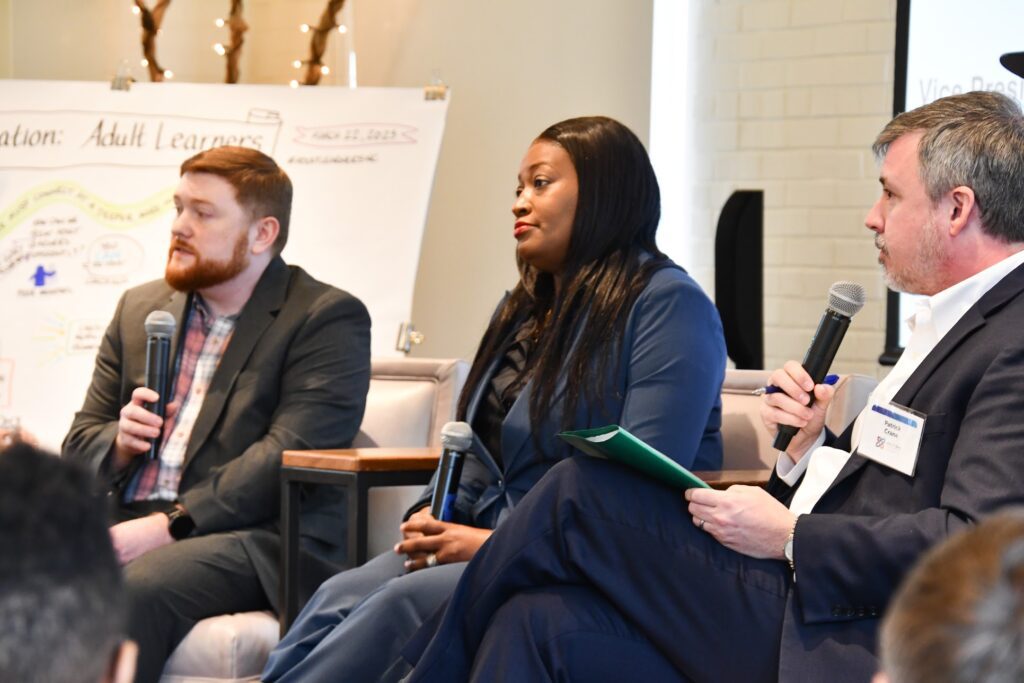

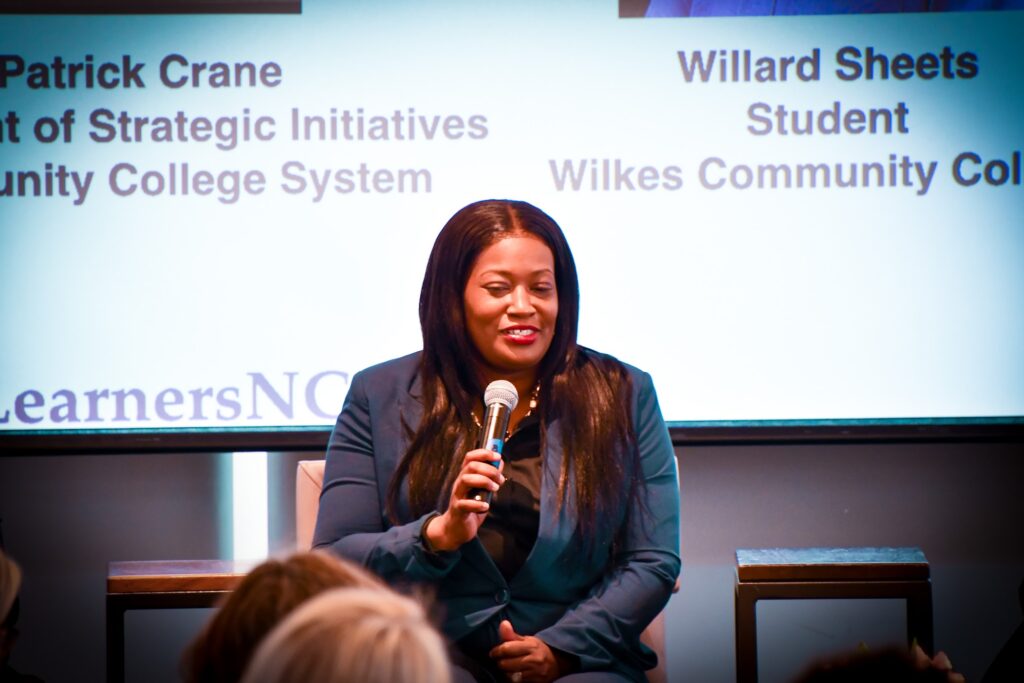

A postcard also reconnected Sheets to Wilkes Community College. Sheets actually first attended Wilkes after high school, when he earned an associate in science degree to work as a maintenance technician.
“I grew up hearing that you go through school, go to college, have your degree, and then you’re good to go. That started to happen for me,” Sheets said. “I knew at the time I wanted to earn a bachelor’s, but didn’t know how.”
He received a postcard from Wilkes about a month before he got laid off, following budget cuts at his company. Though he had thrown the postcard away, he remembered it after losing his job, wondering what his next step was.
“I sort of took that as a signal,” Sheets said. “Maybe I needed to go back and work toward more credentials to help with moving forward.”
Hardin and Sheets identified challenges they’ve faced as adult learners: trying to relate with younger students, and scheduling challenges around work and family needs, including classes and services like tutoring that don’t always offer evening options. Community colleges should offer more flexibility around schedules, different learning styles, and technology resources, they said.
The student panelists also named many supports – namely, strong communication from teachers and encouragement along each step of the way. Both Hardin and Sheets also like the idea of peer mentoring programs for adult learners, which they heard about at an earlier convening session.
For each student, community college represents an opportunity to move further in their careers and actualize their potential. And their advice for other potential adult learners?
You might be thinking about when is a good time to start – a good time is now. Because the sooner you get started, the sooner you will hit those goals and get that credential and have the career outcomes that you’re looking for. And also, as was mentioned this morning, maybe be prepared to sacrifice some Netflix time – that really resonated with me.
Willard Sheets
I say go for it. It starts with encouragement, support from the people around you, but you have to believe in yourself before – that will take you far.
LaShawnna Hardin
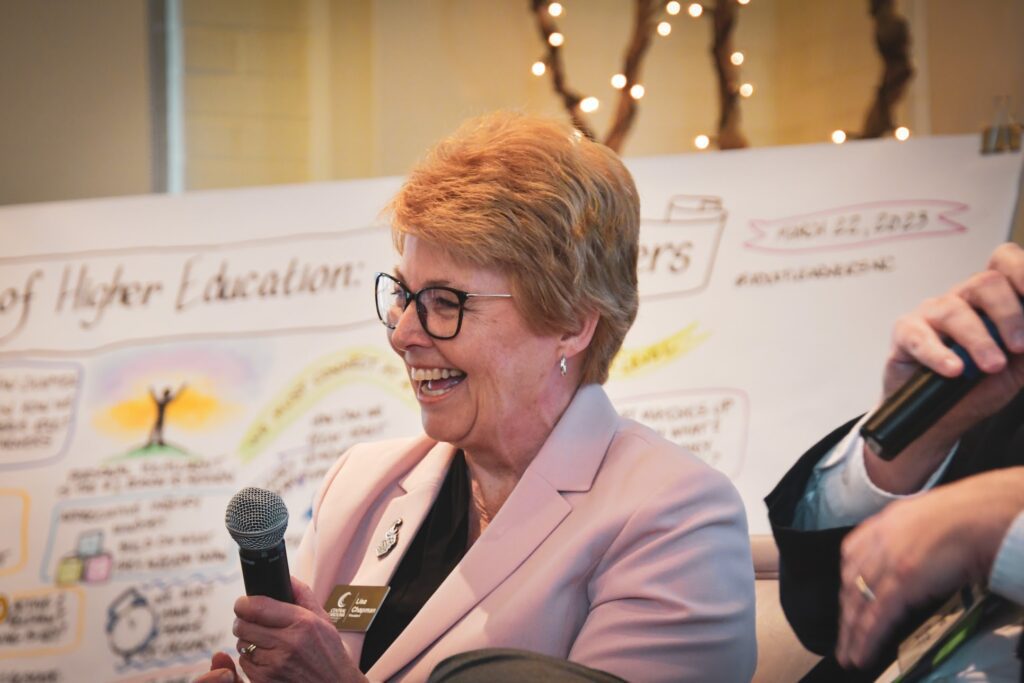

Presidential perspectives
Why do adult learners matter?
Throughout the convening, several N.C. community college presidents tackled the question.
The most important reason why adult learners matter is because they are oftentimes the people who need us the most. Community colleges have been in this work forever. We’ve always been the builders of bridges from poverty, and the best hope for non-traditional students. We are the best hope for meeting the challenges of an education system and an economic system that are out of sync with job seekers.
Dr. Janet Spriggs, Forsyth Technical Community College president
Dr. Lawrence Rouse, president of Pitt Community College, spoke about his team’s realization that colleges must treat adult learners differently in order to meet their needs. That realization was the idea behind the college’s adult learning center, which opened in 2021 – the first center of its kind in the state.
The college is also working to develop a peer mentorship program, transportation route through Pitt County, and a reentry program.
“We’re now trying to be intentional of the service that we offer,” Rouse said. “This is important because we want to look at social mobility, at trying to eradicate some of the poverty, if you look at this county, we’re at right about a 24% poverty rate – and with us having the industries we have there, there should be no reason to have that kind of poverty.”
Dr. Lisa Chapman, president of Central Carolina Community College, urged attendees to keep doing the work and sharing stories about it – “over and over and over again.”
“Dallas Herring not only said, ‘take people from where they are for as far as they can go,’ but he said because the state of North Carolina needs them,” Chapman said. “If we want to keep being the state that people come to for business, we better take care of business. Nobody does that better than the Great 58, and nobody can engage with adult learners as well as we do. And they’re the ones that are going to help us meet that need.”
Dr. Brian Merritt, president at McDowell Technical Community College, said that rural, smaller colleges need resources and funding to really make adult learner work happen.
“It’s desperately needed if we’re going to be able to continue the conversation,” he said. “Especially in our rural institutions, because our communities rely on us.”
Merritt also highlighted the need to better serve historically underserved students.
Wilkes Community College President Dr. Jeff Cox concluded the convening by challenging attendees to take what they learned back to their colleges. Near the end of the convening, the Belk Center led colleges through “team time,” to brainstorm how their institutions might public messaging, partnerships, processes, pathways, and proximity regarding to adult learners.
Cox said community colleges must creatively “figure out more and better ways” to connect adults to new jobs coming to the state – or else get left behind.
“We’re in the education business. We’ve got to convince folks we can do it better, more economically, more efficiently,” he said. “… I hope you will go back inspired to really connect in an even deeper way with our adult learners, for being that bridge for them to a brighter tomorrow, economic mobility, and also meeting the needs of our business and industry across the state.”
Editor’s note: The John M. Belk Endowment supports the work of EducationNC.



